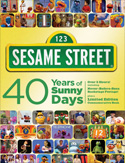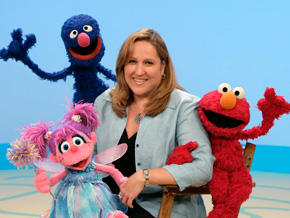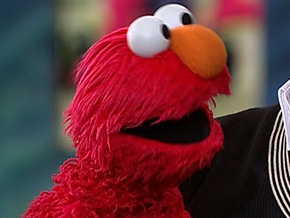Celebrating Sesame Street
40 Years of Sunny Days

In South Africa, it's Takalani Sesame. Mexicans know it as Plaza Sesamo, and Palestinians tune in to Shara's Simsim. But, in America, this beloved children's program is simply Sesame Street.
Since Sesame Street premiered on November 10, 1969, generations of children have found their way to this magical place where furry monsters and one Big Bird live alongside friendly neighbors. This PBS program delights children with rhyming songs, games and playful puppets, but at its core, Sesame Street is quite serious.
In the '60s, television producers, teachers and researchers came together to develop an educational show for young children, specifically those living in low-income communities, and better prepare them for school. A curriculum was developed, and famed puppeteer Jim Henson came on board to create the show's nonhuman cast members, including Big Bird, Cookie Monster and Oscar the Grouch.
To appeal to its target demographic, Sesame Street was designed to look like an inner-city street and populated with white, black, Hispanic and Asian neighbors. The community was so integrated, in fact, a Mississippi state commission voted to ban the program in 1969. But, by the start of Season 2, the ban was lifted.
Decades later, Sesame Street continues to push the envelope and promote diversity, positivity and, most importantly, education. In celebration of its 40th anniversary, new and classic segments and backstage exclusives are now available as a two-disc DVD set, Sesame Street: 40 Years of Sunny Days.
If there's one person who can appreciate the show's historic beginnings and bright future, it's executive producer Carol-Lynn Parente.
Since Sesame Street premiered on November 10, 1969, generations of children have found their way to this magical place where furry monsters and one Big Bird live alongside friendly neighbors. This PBS program delights children with rhyming songs, games and playful puppets, but at its core, Sesame Street is quite serious.
In the '60s, television producers, teachers and researchers came together to develop an educational show for young children, specifically those living in low-income communities, and better prepare them for school. A curriculum was developed, and famed puppeteer Jim Henson came on board to create the show's nonhuman cast members, including Big Bird, Cookie Monster and Oscar the Grouch.
To appeal to its target demographic, Sesame Street was designed to look like an inner-city street and populated with white, black, Hispanic and Asian neighbors. The community was so integrated, in fact, a Mississippi state commission voted to ban the program in 1969. But, by the start of Season 2, the ban was lifted.
Decades later, Sesame Street continues to push the envelope and promote diversity, positivity and, most importantly, education. In celebration of its 40th anniversary, new and classic segments and backstage exclusives are now available as a two-disc DVD set, Sesame Street: 40 Years of Sunny Days.
If there's one person who can appreciate the show's historic beginnings and bright future, it's executive producer Carol-Lynn Parente.

Photo: Richard Termine
Parente's love of Sesame Street started at an early age. As a child, she tuned in to see Grover, her favorite character. Then, as an adult, she landed a position as the assistant to the post-production supervisor, which she says involved schlepping hundreds of tapes to the edit room. Over 21 seasons, she worked her way to the top and watched as the show evolved.
"I like to describe the 40 years of Sesame Street like a 40-year timeline for history and pop culture because those references are so much a part of the show," she says. "There are all sorts of little changes. We have kids riding bikes on the sets who now wear bike helmets, and they didn't back in the early days. But so much of the warmth and sense of humor of the show is just the same as it always was."
Over the years, Sesame Street has adjusted its curriculum and welcomed new neighbors to the block, but its concept and goals have stayed constant. Parente says the show has always been written on two levels—one for children and one for parents—to better educate young viewers. "We know the best way extend the learning beyond our show is to have children co-view with a parent or caregiver," she says.
At the start of every season, Parente says experts and educators meet with Sesame Street producers to help them find the best ways to teach children about topics like hygiene, nature, personal relationships and difficult life events.
Sesame Street has never shied away from tough topics, and in the '80s, when Will Lee, the actor who played the beloved Mr. Hooper, died of a heart attack, producers took the opportunity to teach children about death. After consulting child psychologists, they wrote an episode called "Farewell, Mr. Hooper," which aired in 1983.
"What differentiates us from the rest of children's shows is we do deal with those kinds of issues," Parente says. "We didn't set out to teach death. We had our cast member pass away. I think any other children's show would have just recast the role of Mr. Hooper. ... But we chose the opportunity to deal with something that's difficult to talk to kids about."
"I like to describe the 40 years of Sesame Street like a 40-year timeline for history and pop culture because those references are so much a part of the show," she says. "There are all sorts of little changes. We have kids riding bikes on the sets who now wear bike helmets, and they didn't back in the early days. But so much of the warmth and sense of humor of the show is just the same as it always was."
Over the years, Sesame Street has adjusted its curriculum and welcomed new neighbors to the block, but its concept and goals have stayed constant. Parente says the show has always been written on two levels—one for children and one for parents—to better educate young viewers. "We know the best way extend the learning beyond our show is to have children co-view with a parent or caregiver," she says.
At the start of every season, Parente says experts and educators meet with Sesame Street producers to help them find the best ways to teach children about topics like hygiene, nature, personal relationships and difficult life events.
Sesame Street has never shied away from tough topics, and in the '80s, when Will Lee, the actor who played the beloved Mr. Hooper, died of a heart attack, producers took the opportunity to teach children about death. After consulting child psychologists, they wrote an episode called "Farewell, Mr. Hooper," which aired in 1983.
"What differentiates us from the rest of children's shows is we do deal with those kinds of issues," Parente says. "We didn't set out to teach death. We had our cast member pass away. I think any other children's show would have just recast the role of Mr. Hooper. ... But we chose the opportunity to deal with something that's difficult to talk to kids about."

Parente says Sesame Workshop, the educational organization behind Sesame Street and dozens of co-productions around the world, strives to be there for children in need. When the organization saw a dramatic rise in HIV/AIDS cases in South Africa, they made the controversial decision to introduce an HIV-positive puppet to the cast.
"The co-productions in other countries allow us to tailor our curriculum to the needs of the community," she says.
In addition to the ABCs and 123s, this Emmy-winning program also teaches children to be accepting of all people. After all, if Gordon and Maria can co-exist with a grouchy, green trash dweller, anything is possible.
"We certainly have modeled diversity, not just ethnically, but also in abilities," Parente says. "We're one of few shows that deals with all abilities in children and adults. Sometimes it's just in an inclusive manner, which is a very powerful way for kids to model that it's okay to have friends and play with children whether they're in a wheelchair, have braces, cochlear implants or Down syndrome."
One more lesson Oscar, Elmo and the colorful Sesame Street gang have taught us is learning doesn't have to be snooze-inducing. Special guest stars, musical numbers and animation make it fun for all.
Parente says stars like Cameron Diaz, Adam Sandler, Sarah Jessica Parker, Kobe Bryant, Eva Longoria and Cedric the Entertainer are stopping by Sesame Street to play in the upcoming season. And, in the 40th anniversary episode, first lady Michelle Obama visited to teach Elmo about healthy habits and gardening.
So remember, whether you're in America, Mexico, Israel or Afghanistan, you can always find your way to Sesame Street.
"The co-productions in other countries allow us to tailor our curriculum to the needs of the community," she says.
In addition to the ABCs and 123s, this Emmy-winning program also teaches children to be accepting of all people. After all, if Gordon and Maria can co-exist with a grouchy, green trash dweller, anything is possible.
"We certainly have modeled diversity, not just ethnically, but also in abilities," Parente says. "We're one of few shows that deals with all abilities in children and adults. Sometimes it's just in an inclusive manner, which is a very powerful way for kids to model that it's okay to have friends and play with children whether they're in a wheelchair, have braces, cochlear implants or Down syndrome."
One more lesson Oscar, Elmo and the colorful Sesame Street gang have taught us is learning doesn't have to be snooze-inducing. Special guest stars, musical numbers and animation make it fun for all.
Parente says stars like Cameron Diaz, Adam Sandler, Sarah Jessica Parker, Kobe Bryant, Eva Longoria and Cedric the Entertainer are stopping by Sesame Street to play in the upcoming season. And, in the 40th anniversary episode, first lady Michelle Obama visited to teach Elmo about healthy habits and gardening.
So remember, whether you're in America, Mexico, Israel or Afghanistan, you can always find your way to Sesame Street.
Keep Reading






